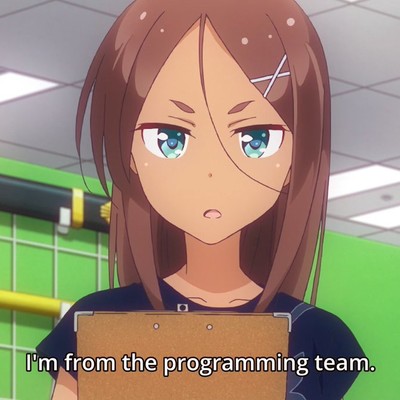

@supervent @nn4x This goodness, absolutely this.
Why is anyone still using the #clearnet for this?
#I2P is absolutely one of the better options.
Programmer and Free Software proponent.
Extra Pins:
Writing Privacy-preserving software & services 101: https://mastodon.top/@lispi314/110849018589421824


@supervent @nn4x This goodness, absolutely this.
Why is anyone still using the #clearnet for this?
#I2P is absolutely one of the better options.


@kde@floss.social @kde@lemmy.kde.social From the article it seems more of a #Qt win for now (though it does mention patches for many others), but in any case that’s neat.
Now it all just needs sane ways to interface from #CommonLisp.


@panamared27401 @chucker @kkarhan @ajsadauskas @technology @music@fedibb.ml @music@lemmy.ml @senficon I’ve noticed that too. I think it might relate to the difference in how usually it’s seen as normal & necessary to hire us for labor rather than to buy (or license 😬) specific products/works ready-made.
With musicians having the rougher end of things there. Their labor is less commonly recognized.
And then of course malware, corporate or not, tends to have direct negative impacts on users or their victims.


@salarua Stuff like MusicBrainz or the various boorus & iqdb/saucenao, for two examples that are mostly crowdsourced (whereas Google Images is very much a corporate-made tool that’s also often much harder to use).


@panamared27401 @chucker @kkarhan @ajsadauskas @technology @music@fedibb.ml @music@lemmy.ml @senficon Well yes, the notion of productivized digital works is an inevitable casualty (it never really made sense either, as Taxxon highlights in her videos).
Voluntary support remains.
On the software side of things, I’d most definitely welcome the death of proprietary software and productivized software.
It has led to an absolutely awful amount of corporate malware being normalized, among other atrocities.


@panamared27401 @chucker @kkarhan @ajsadauskas @technology @music@fedibb.ml @music@lemmy.ml @senficon I think it might finally motivate people to participate in the indexing efforts I care about, since they’re the only real way to mitigate that.
Currently other than archival nerds and data hoarders, barely anyone seems to care.


@panamared27401 @chucker @kkarhan @ajsadauskas @technology @music@fedibb.ml @music@lemmy.ml @senficon One would think the ease of attribution and finding out plagiarism on the internet would help mitigate that.
Credit/attribution remains essential.


@panamared27401 @chucker @kkarhan @ajsadauskas @technology @music@fedibb.ml @music@lemmy.ml @senficon Well, that’s where the crowdsourced patronage & merchandise models (among two typical options) come in.
Both unfortunately rely on popularity with an audience will & able to pay to really work.
They’re hardly the only options, streamers have found corporate sponsors for example, but I couldn’t call myself an expert in alternative monetization practices.


@panamared27401 @chucker @kkarhan @ajsadauskas @technology @music@fedibb.ml @music@lemmy.ml @senficon The same way any other creative labor is paid.
I certainly wouldn’t write code for companies without fair remuneration.
Most other forms of creative work also lend themselves a bit better to crowdsourced patronage & merch than my own craft.
In any case, the value is with the labor, not the resulting work. Mostly only labor can lead to new works or improvements to old ones.


@panamared27401 @chucker @kkarhan @ajsadauskas @technology @music@fedibb.ml @music@lemmy.ml @senficon Much like patents it also fails to account for the concept of parallel invention, which is made worse by the general way humans assimilate patterns from stories and art with the distinct possibility of reusing some bit without even meaning to (hence the cognitohazard bit).


@panamared27401 @chucker @kkarhan @ajsadauskas @technology @music@fedibb.ml @music@lemmy.ml @senficon Copyright inherently means you cannot replicate an idea you might have come across before in any way without licensing it (which is profoundly exclusionary due to the economic dynamics involved).
Given that human culture generally involves the sharing of stories and ideas, it turns all culture covered by copyright into cognitohazards that poison any attached material.


@chucker @kkarhan @panamared27401 @ajsadauskas @technology @music@fedibb.ml @music@lemmy.ml @senficon I think that being unable to use nor remix music for years is far too long.
It doesn’t remain broadly relevant for all that long in popular culture anyway. Before the internet that cycle was at the very most decade-long, now it has shrunk dramatically as information travels faster and more broadly.
Copyright also inherently assumes you have a right to control the minds of others, which I deem unconscionable.


@kkarhan @panamared27401 @ajsadauskas @technology @music@fedibb.ml @music@lemmy.ml @senficon 25 years is a long ass time to turn ideas into cognitohazards you can’t watch nor use in culture.
Any time at all is quite long for deciding you can choose what others may think and say.
@ad_on_is The problem you’re hitting is that the #clearnet / #Internet in general weren’t adequately designed to handle malicious #infrastructure operators.
“The 'net interprets censorship as damage and routes around it” was a comment about #Usenet, a #federated / #P2P system with gossiped (https://en.wikipedia.org/wiki/Gossip_protocol) message exchange which wasn’t particularly picky about its transport layer (indeed you could load a spool on a floppy and mail it), not the internet.